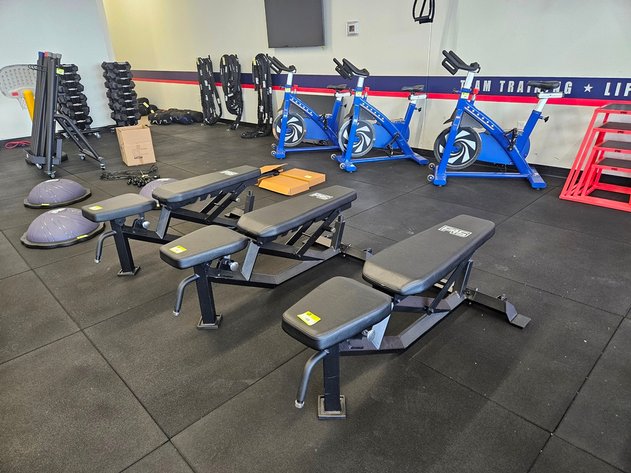How to Sell Your Equipment Online: A Retirement Plan for Small Businesses
Why Choose Online Auctions?
When you're ready to retire, an online auction can help you sell your equipment, whether you're a welder, electrician, cabinet maker, plumber, or mason. Online auctions have several advantages when equipment of sale, including:
1. Broad Market Reach:
As a small business tradesman, reaching a wide audience is crucial when selling equipment. Online auctions provide the perfect solution by granting access to a vast market beyond your local area. According to Statista's data for 2023, there are approximately 312 million internet users alone in the United States, representing a large market.
Online auctions allow you to reach potential buyers nationwide through online auctions. This broader reach significantly increases your chances of getting the best deal on your equipment. Internet users create a competitive environment where bidders vie against each other, ultimately raising the price of your valuable assets.
As a result, online auctions are the most effective and efficient way to sell off your equipment and maximize your returns.
2. Competitive Bidding:
During auctions, buyers compete against each other, driving up prices and potentially resulting in higher returns. A study conducted by the National Auctioneers Association (NAA) found that online auctions consistently achieve higher prices compared to traditional sales methods.
This competitive bidding environment of online auctions ensures that you receive fair market value and leads to sales that exceed the expected market value.
3. Efficient Selling Process:
SBA statistics show small businesses spend an average of 32 hours monthly on administrative tasks, including sales and marketing.
Online liquidation auctions offer a streamlined selling experience, letting you easily list and display your equipment. The platform handles the bidding process and facilitates transactions, saving you time and effort compared to traditional selling methods.
4. Transparency and Trust:
Among buyers and sellers, transparency plays an important role in building trust. In a survey conducted by eMarketer, 60% of online shoppers considered transparency a significant factor in their purchase decisions.
Reputable online auction platforms, such as Auction Masters, provide transparency and security, which builds trust between buyers and sellers. Buyers can make informed decisions based on detailed descriptions, photos, and buyer feedback mechanisms.
Step-by-Step Guide to Selling Your Equipment via Online Auction
Interested in selling your small business through an online auction platform but need to know where to begin? Follow these steps to sell equipment through an online auction:
Step 1: Preparing Your Equipment for Sale
When it comes to selling your equipment through online auctions, proper preparation is key to attracting potential buyers and maximizing your returns. You will find here a step-by-step guide to help you sell your equipment.
a. Evaluate Your Equipment
Conduct a thorough assessment of each piece of equipment before listing it for sale. Consider its condition, age, and market demand. Look for wear and tear, visible damage, or signs of regular use. This evaluation will help you determine the equipment's overall value and set appropriate expectations for potential buyers.
Additionally, document the maintenance history of each item. It includes any routine servicing, repairs, or upgrades. Buyers are often interested in the maintenance record as it assures proper care and can increase the perceived value.
Don't forget to highlight any unique features or accessories that may enhance the appeal of your equipment. Depending on your equipment, this may include specialized attachments, advanced technology integration, or specific customization.
b. Gather Documentation and Information
A successful equipment sale requires the collection and organization of relevant documentation. Obtain maintenance records, warranties, and user manuals for the equipment to provide valuable information to potential buyers. Prepare detailed descriptions highlighting your equipment listings' features, specifications, and selling points. Provide clear and accurate information about the equipment's capabilities, dimensions, and accessories.
c. Clean and Repair Equipment
A well-presented piece of equipment is also crucial to attracting buyers and increasing bidding competition. Be sure to clean off dirt, dust, or debris on your equipment before listing it. A well-maintained and visually appealing piece creates a positive impression, increasing its desirability. Address minor repairs and maintenance tasks that are feasible. This includes tightening loose bolts, replacing worn parts, or addressing cosmetic imperfections. While major repairs may not be feasible or cost-effective, taking care of minor issues demonstrates your commitment to providing quality equipment.
Step 2: Choosing the Right Online Auction Platform
In the digital age, selecting the right online auction platform is crucial for a successful equipment sale. To help you choose an online auction platform, here are some tips:
I. Research Auction Platforms
Do thorough research on reputable equipment auction platforms before choosing one. Consider platforms like Auction Masters that have a strong track record, positive user reviews, and expertise in handling equipment auctions. Identify the differences between platforms' fees, including listing fees, commissions, and additional charges. Ensure the costs align with your budget and expected returns. Consider the number of registered buyers and their marketing efforts in assessing the platform's reach. A wider reach increases the exposure of your equipment, attracting more qualified buyers.
II. Consider Local and Niche Platforms
Based on your location and industry, consider local or niche auction platforms. These platforms cater to a specific target market, attracting buyers interested in your equipment. Choosing a niche platform increases the chances of finding buyers who are specifically looking for what you have to offer. Local platforms can be advantageous if you have a concentrated customer base in a specific area. Many local buyers prefer to purchase from nearby sellers to reduce shipping costs and facilitate inspections and pickups.
III. Understand Platform Fees and Policies
Before choosing an online auction platform, review and understand its fee structure and policies. Observe listing fees, commissions, and any additional charges for premium features. You should also be familiar with the platform's return, dispute resolution, and payment processing policies. Look for platforms with clear guidelines and robust mechanisms for resolving issues, ensuring a smooth and secure transaction for all parties involved.
Step 3: Listing and Marketing Your Equipment
After choosing the right online auction platform, it's time to create compelling listings and implement effective marketing strategies. This step will provide you with valuable insights into maximizing the visibility of equipment and attracting potential buyers.
1) Create Compelling Listings
Ensure that your equipment listings are accurate and engaging to attract buyers. Provide detailed descriptions highlighting unique features, conditions, and specifications. Transparency is key when it comes to wear and tear or known issues. To emphasize the value of the equipment, use persuasive yet informative language. Capturing buyer interest requires a visual appeal. A high-quality photo should be taken from multiple angles in order to enable buyers to visualize the equipment. Ensure the images are well-lit, showcase key features, and accurately represent their appearance.
2) Utilize Marketing Channels
The liquidation auction company you select should promote your auction through various marketing channels is essential to reach a wider audience of potential buyers. They can promote your auction platform listing or your own landing page using your business website and social media channels. They should engage with industry-specific forums, online communities, and trade networks. As a seller, you should tap into your customer base and professional connections. Send them personalized emails or newsletters to inform them about the equipment for sale. Generating interest through word-of-mouth referrals from satisfied customers and colleagues is highly effective.
3) Leverage SEO Strategies
Your equipment listings will be significantly more visible when the auction company you select implements search engine optimization (SEO) strategies. They should put relevant keywords and phrases in your listings that potential buyers may search for. They should target your audience with industry-specific terms and phrases. Include keywords naturally within the listing descriptions, titles, and tags. They should be careful not to use keyword-stuffed or spammy language, instead focusing on providing valuable information while incorporating SEO elements to improve your listings' ranking in search results.
Step 4: Closing the Sale
Once the auction concludes and the auction company has identified the winning bidders, it's time to focus on closing the sale and finalizing the transaction. During this step, you will be guided through the steps needed to ensure the security and transparency of the process.
i. Finalize the Transaction
The auction liquidation company should communicate with the winning bidders to initiate the finalization of the transaction. They should contact them promptly to discuss the payment process, shipping or pickup arrangements, and anything else they need to know. In order to make a successful sale, they should make sure the terms are clear and transparent. Identify the timeline for payment, any applicable taxes or fees, and both parties responsibilities for shipping, insurance, or other logistical issues. A clear understanding of the transaction will prevent future misunderstandings and disputes.
ii. Secure Payment
Both parties should be assured that the payment method is secure and reliable. The auction company you select should use trusted online payment platforms that protect buyers and sellers. These platforms provide an added layer of security and can help facilitate a smooth and secure transaction. Alternatively, they can also use traditional payment methods such as cashier's check or bank transfer. Whatever payment method chosen, ensure it is secure and provides a verifiable transaction record.
iii. Maintain Professionalism and Transparency
The online auction company should demonstrate professionalism and transparency throughout the closing process. They should provide receipts, invoices, and any necessary documentation related to the transaction. Make sure all parties are clear about expectations and obligations associated with the sale by responding promptly to any further inquiries or requests.
Conclusion
Retirement marks a significant milestone in the life of a small business tradesman. Selling your equipment via online auctions presents numerous advantages, including wide market reach, competitive bidding, convenience, and transparency. You can successfully navigate the process of selling your equipment online by following the steps provided in this article. Embrace the power of online auctions to maximize your returns and close this chapter of your professional journey on a high note.













